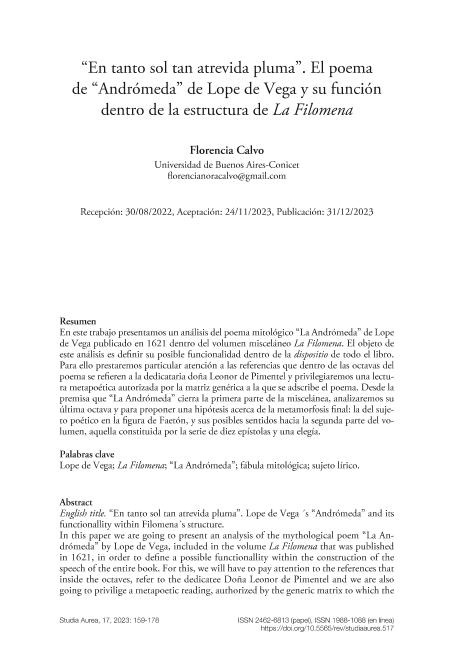Mostrar el registro sencillo del ítem
dc.contributor.author
Calvo, Florencia Nora

dc.date.available
2024-03-27T11:54:57Z
dc.date.issued
2023-12
dc.identifier.citation
Calvo, Florencia Nora; "En tanto sol tan atrevida pluma": El poema de "Andrómeda" de Lope de Vega y su función dentro de la estructura de La Filomena; Universitat Autònoma de Barcelona; Studia Aurea; 17; 12-2023; 159-178
dc.identifier.uri
http://hdl.handle.net/11336/231648
dc.description.abstract
En este trabajo presentamos un análisis del poema mitológico “La Andrómeda” de Lope de Vega publicado en 1621 dentro del volumen misceláneo La Filomena. El objeto de este análisis es definir su posible funcionalidad dentro de la dispositio de todo el libro. Para ello prestaremos particular atención a las referencias que dentro de las octavas del poema se refieren a la dedicataria doña Leonor de Pimentel y privilegiaremos una lectura metapoética autorizada por la matriz genérica a la que se adscribe el poema. Desde la premisa que “La Andrómeda” cierra la primera parte de la miscelánea, analizaremos su última octava y para proponer una hipótesis acerca de la metamorfosis final: la del sujeto poético en la figura de Faetón, y sus posibles sentidos hacia la segunda parte del volumen, aquella constituida por la serie de diez epístolas y una elegía.
dc.description.abstract
In this paper we are going to present an analysis of the mythological poem “La Andrómeda” by Lope de Vega, included in the volume La Filomena that was published in 1621, in order to define a possible functionallity within the construction of the speech of the entire book. For this, we will have to pay attention to the references that inside the octaves, refer to the dedicatee Doña Leonor de Pimentel and we are also going to privilige a metapoetic reading, authorized by the generic matrix to which the poem is ascribed. From the premise that “La Andrómeda” within a possible internal division of the miscellany closes the first part, we are going to analyse its last eighth and will establish, following the proposed line of reading, a hypothesis about the final metamorphosis, the ones from the lyrical subject in Faeton´s figure and its possible meanings towards the second part of the volume, made up of a series of ten epistles and an elegy.
dc.format
application/pdf
dc.language.iso
spa
dc.publisher
Universitat Autònoma de Barcelona

dc.rights
info:eu-repo/semantics/openAccess
dc.rights.uri
https://creativecommons.org/licenses/by/2.5/ar/
dc.subject
Lope de Vega
dc.subject
Poesia barroca
dc.subject
Sujeto lirico
dc.subject
La Filomena
dc.subject.classification
Literaturas Específicas

dc.subject.classification
Lengua y Literatura

dc.subject.classification
HUMANIDADES

dc.title
"En tanto sol tan atrevida pluma": El poema de "Andrómeda" de Lope de Vega y su función dentro de la estructura de La Filomena
dc.title
"En tanto sol tan atrevida pluma": Lope de Vega's "Andrómeda" and its functionallity within Filomena's structure
dc.type
info:eu-repo/semantics/article
dc.type
info:ar-repo/semantics/artículo
dc.type
info:eu-repo/semantics/publishedVersion
dc.date.updated
2024-03-26T13:52:55Z
dc.identifier.eissn
1988-1088
dc.journal.volume
17
dc.journal.pagination
159-178
dc.journal.pais
España

dc.journal.ciudad
Barcelona
dc.description.fil
Fil: Calvo, Florencia Nora. Consejo Nacional de Investigaciones Científicas y Técnicas; Argentina. Universidad de Buenos Aires. Facultad de Filosofía y Letras. Instituto de Filología y Literatura Hispánica "Dr. Amado Alonso"; Argentina
dc.journal.title
Studia Aurea
dc.relation.alternativeid
info:eu-repo/semantics/altIdentifier/url/https://studiaaurea.com/article/view/v17-calvo
dc.relation.alternativeid
info:eu-repo/semantics/altIdentifier/doi/http://dx.doi.org/10.5565/rev/studiaaurea.517
Archivos asociados
